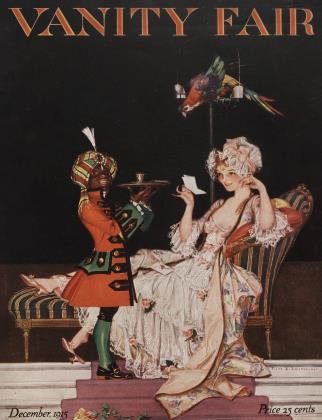Sign In to Your Account
Subscribers have complete access to the archive.
Sign In Not a Subscriber?Join NowTHE SPIRIT OF THE CAFÉ
Why It Exists in Paris and Not in London
Arthur Symons
WHEN my French friends come to London they say to me: Where is your Montmartre, where is your Quartier Latin? We have no Montmartre (not even Chelsea is that), no Quartier Latin, because there is no instinct in the Englishman to be companionable in public. Occasions are lacking, it is true, for the cafe is responsible for a good part of the artistic Bohemianism of Paris, and we have no cafes. I prophesy in these pages that some day someone, probably an American who has come here by way of Paris, will set back the plate-glass windows in many angles, which I could indicate to him, of the Strand, Piccadilly, and other streets, and will turn the whole wall into windows, and leave a space in front for a terrasse, in the Paris manner, and we shall have cafes like the cafes in Paris, and the prestidigitateur who has done this will soon have made a gigantic fortune. But meanwhile let us recognize that there is in London no companionship in public (in the open air, or visible through windows) and that nothing in Cafes Royaux and Monicos and the like can have the sort of meaning for young men in London that the cafes have long had, and still have, in Paris. Attempts have been made, and I have shared in them, and for their time they had their entertainment; but I have not seen one that flourished.
I remember the desperate experiments of some to whom Paris, from a fashion, had become almost a necessity; and how Dowson, the poet, took to cabmen's shelters as a sort of supper-club. Different taverns were at different times haunted by young writers; some of them came for the drink and some for the society; and one bold attempt was made to get together a cenacle in quite the French manner in the upper room of a famous old inn. In London we cannot read our poems to one another, as they do in Paris; we cannot even talk about our own works, frankly, with a natural pride, a good-humored equality. They can do that in Dublin, and in an upper room in Dublin I find it quite natural. But in London even those of us who are least AngloSaxon cannot do it. Is it more, I wonder, a loss to us, or a gain?
THIS lack of easy meeting and talking is certainly one of the reasons why there have been in England many great writers but few schools. In Paris a young man of twenty starts a "school" as he starts a "revue"; and these hasty people are in France often found among the people who last. In London we have had nothing like the time of Victor Hugo, when Baudelaire and Gautier and Gerard de Nerval and men of obscure and vagabond genius made the cafes of Paris vital, a part of themselves, a form of creative literature. That life is what London has in itself the genius, the men and the material, to be; but of the men of our time only Henley and John Davidson loved it enough to strike music out of it.
 View Full Issue
View Full Issue












Subscribers have complete access to the archive.
Sign In Not a Subscriber?Join Now